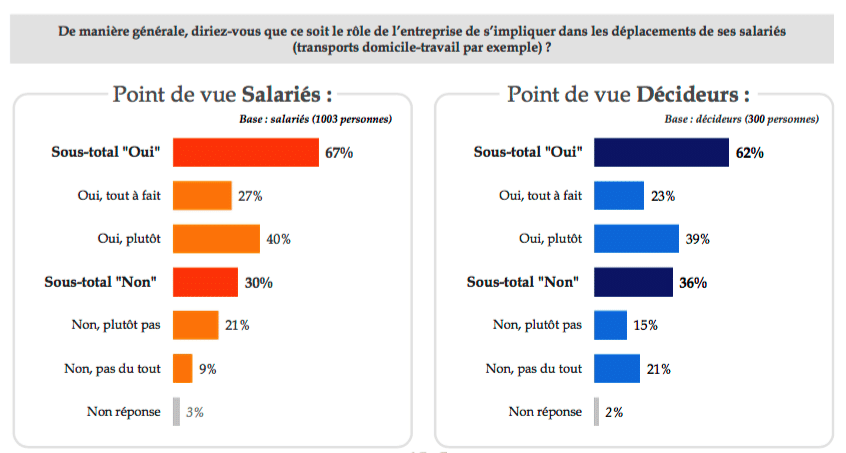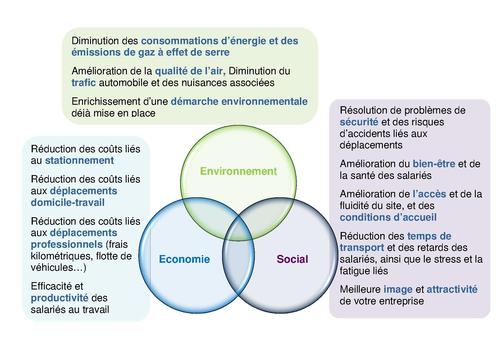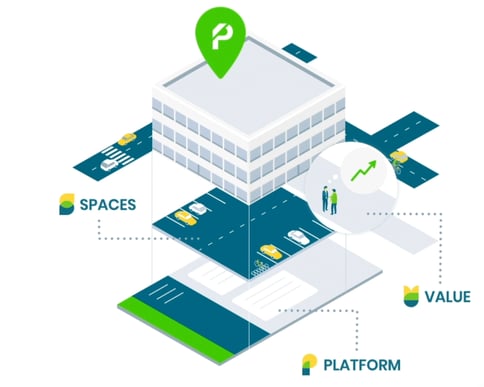Today, our society is facing a lack of mobility, which has a significant economic cost for companies and negative effects on our health.
Thus, mobility is without a doubt one of the greatest contemporary societal challenges we face. The future of mobility can be summed up in a trend, that of the transition from a product to a service.
As quoted by Michel Lussault (2007) "today, mobility is a functional necessity but even more a claim, a condition of realization of the existence and affirmation of freedom".
Today, the role of the company as a mobility player is paramount not only in the eyes of employees (67%) but also decision-makers (62%).

Mobility within companies is undergoing real change, as two out of three people currently work on several sites at the same time. Indeed, half work at home and 40% on the move. This mobile trend will become stronger as working on the move will become more and more common.
There is also a willingness of companies to establish a mobility assessment. The aim of this assessment is to obtain a quick diagnosis of the company's travel situation, while identifying the measures and actions implemented or envisaged with a view to improving the general accessibility of the company.
Since 1 January 2018, structures with more than 100 employees will have to implement a Corporate Travel Plan (PDE) in order to strengthen the company's involvement in the daily mobility of its employees.

It brings together a set of measures to increase the efficiency and effectiveness of employee travel in a company to reduce their pollutant emissions and reduce road traffic.
This Corporate Travel Plan is the result of several developments such as the gradual change of paradigm between ownership and sharing (collaborative economy), hyper-connectivity and the culture of a certain well-being in business. This change in mobility patterns is seen as an opportunity for companies as it will allow them to enhance their attractiveness, while contributing to the well-being and productivity of their employees.
Thus, the decline of the private car in favor of shared mobility heralds a new social and economic momentum for companies, transforming their internal models for the benefit of their employees but also their activities.
These articles may also be of interest to you:
>>> What is shared mobility? <<<
>>> How to promote public transports within your company? <<<
In recent years, sustainable mobility has become a real social issue despite the fact that there are still many obstacles, as 70% of business leaders find it difficult to set up. However, it is important to realize that ignoring the mobility expectations of employees leads to dissatisfaction and lack of motivation.
The consequences are quickly felt: business activities slow and turnover increases. Employees are no longer motivated; they settle down gradually in a comfort zone and no longer make efforts to achieve the objectives of the company.
To encourage the implementation of a company mobility plan, it is important to educate companies about the source of savings or even profits that result from a sustainable mobility approach. It offers the opportunity to lower transportation costs, optimize the operations of these companies and increase their productivity.
In addition, with an eco-friendly approach, companies also have a better image with consumers and potential candidates for employment. Some companies like BePark offers these services.

The principle of sustainable mobility is to put in place solutions to encourage the use of alternative modes of transport and limit travel. All in order to reduce greenhouse gas emissions, a major environmental challenge.
Encouraging sustainable mobility means, within a company.
To know more: